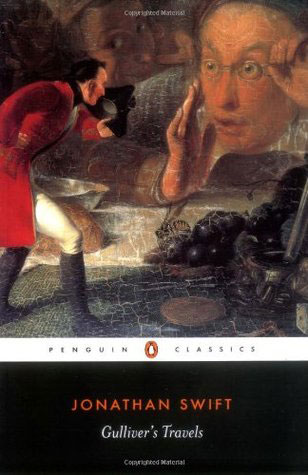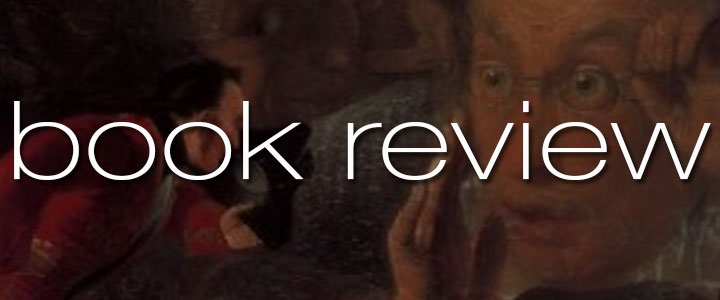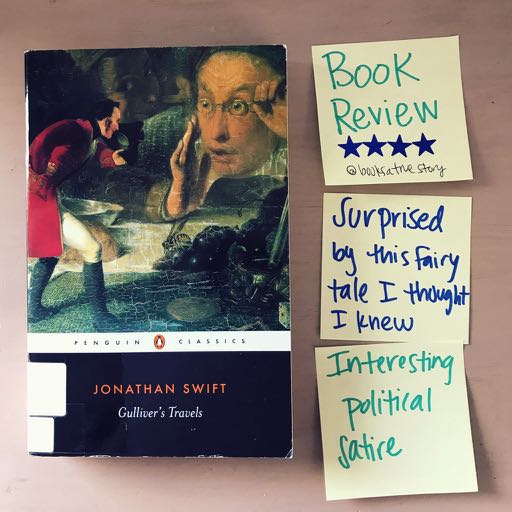
Gulliver's Travels
by Jonathan Swift
Published: October 28th, 1726
Genres: Classic
Format: Paperback (306 pages)
Source: Library
more
'I felt something alive moving on my left leg ... when bending my Eyes downwards as much as I could. I perceived it to be a human Creature not six inches high'
Shipwrecked and cast adrift, Lemuel Gulliver wakes to find himself on Lilliput, an island inhabited by little people, whose heigh...
Gulliver’s Travels immediately reminded me of the Princess Bride. They are both travel novels that make fun of travel novels by having the author retell someone else’s story but edit out the things they don’t like from the “original” story. For Princess Bride, it was pages and pages of packing and unpacking from the fictional novel it’s based on. For Gulliver’s Travels, it was “innumerable passages relating to the winds and tides… (pg 9-10)” although some overly technical passages were left in for kicks and giggles. Another hilarious stab at travel novels was when Gulliver says, “This is enough to say upon the subject of my diet, wherewith other travellers fill their books, as if the readers were personally concerned whether we fared will or ill. (pg 215)” I wonder how many travel novels Jonathan Swift read before he thought, “Shut up about the food!!”
Part I is about the little people and is obviously the most famous part of Gulliver’s Travels, but I didn’t realize that their trees and animals were small, too. Cute! I was surprised by the dark humor in this part, but I enjoyed it. The best example is when the little people discuss the problems of killing Gulliver and the huge carcass that they would have to deal with and the awful plague that would probably come from it.
The little people going through his things and describing them had me as confused as they were. I couldn’t figure out what some of the things were, either, because this book was so old. But their descriptions were delightful.
We saw a hollow pillar of iron, about the length of a man, fastened to a strong piece of timber larger than the pillar; and upon one side of the pillar, were huge pieces of iron sticking out, cut into strange figures, which we know not what to make of.
-Jonathan Swift, Gulliver’s Travels (pg 35)
The little people took themselves way too seriously. They pick their leaders based on tight rope walking and not actual skills. This strange scene led me to Sparknotes where I learned that Gulliver’s Travels was a political satire. I just thought it was a fairy tale. It’s enjoyable as both though it’s less confusing when I knew what he was making fun of. Now I get the tight rope walking thing-it’s about politics and power. Throughout the book, some of the social commentary seemed universal and some seemed to go over my head since I didn’t know some of the context of the time period. The footnotes in this Penguin edition helped a lot.
I couldn’t believe the audacity of the little king asking Gulliver to let them poke his eyes out and calling it lenient. Gulliver says he must not be smart because it seemed the opposite of lenient to him. That’s because it’s not lenient!! Gulliver actually considers doing it because they did give him a nice noble title. I can’t imagine in what universe a noble title would be more useful than your eyes (and I’m pretty sure that’s the point.)
I was also shocked by Part II. I was familiar with the part where he becomes small in a land of giants. But they do whatever they want to him since he’s small including the women playing with him naked. Um…what?! His reaction is to be repulsed by their smell and blemishes that he can now see because of his size. This was disturbing on so many levels (luckily it’s short and not graphic.) According to Sparknotes, the microscope was new at the time and they were interested in the small details of things that actually made them gross.
The political satire became more and more blatant (even without reading Sparknotes, I knew the dispute about the eggs in Part I was referring to Catholics and Protestants) with ironic criticisms of the places he visited, like this example for the giant king in Part II:
He confined the knowledge of governing within very narrow bounds, to common sense and reason, to justic and lenity, to the speedy determination of civil and criminal causes; with some other obvious topics, which are not worth considering.
-Jonathan Swift, Gulliver’s Travels (pg 126)
A more indirect criticism of English politics is when the king doesn’t want to learn about gun powder from Gulliver because he says must have been invented by Satan (which was actually an idea from Milton, according to the footnotes). The king from part II is the one who says this famous quote:
“I cannot but conclude the bulk of your natives to be the most pernicious race of little odious vermin that ever suffered to crawl upon the surface of the earth.”
-Jonathan Swift, Gulliver’s Travels (pg 123)
Part III was the strangest part and the least familiar to me. The society is full of people called flappers who are always getting the attention of people by flapping them with a padded stick so they know when to talk and when to listen. The whole society seemed as zoned out as someone who is severely addicted to their smartphone. The flappers were weird, but maybe they would be useful today going around whacking people when they are on their phone too much. Just a thought.
As strange as part III is, I found it the most relevant. The whole section is a satire on technology. They have such high and unrealistic aspirations that they neglect the present. The experiments they did were absolutely crazy like extracting sunbeams from cucumbers. But according to Sparknotes, all the experiments mentioned were either proposed or actually carried out at the time this was written. After reading this section, I couldn’t help but think that we often use technology to come up with unnecessarily complicated solutions to things or that in the pursuit of advanced technology, we’ve come to neglect basic things. We value innovation at the expense of maintenance.
Allow me to geek out about one interesting fact. In Part III, Jonathan Swift made a fictional predition that Mars had 2 moons that turned out to be true. So cool!!!
Part IV probably had the best wisdom and advice. He visits a utopia populated by intelligent horses. I listened to the audiobook read by David Hyde Pierce and it was delightful, especially in part IV where he pronounces all the horse words like a horse would – neighing and all. Probably my favorite tidbit of wisdom from the horses was when Gulliver was explaining wars. He talks about the reasons and that the worst wars were caused by different opinions especially if they were about “things indifferent. (pg 226)” Sad, but true.
I found this to be another piece of good advice:
He could not understand why nature should teach us to conceal what nature had given; that neither himself nor family were ashamed of any parts of their bodies.
-Jonathan Swift, Gulliver’s Travels (pg 219)
I was surprised that they believed at the time that depression only hit the lazy, luxurious, and rich. They believed hard work was the cure. I’m glad we know more about depression now and this isn’t true. However, this old fashioned perspective reminded me that the lazy and luxurious lives we as modern people does not always make you happy. I would rephrase his statement and replace “depression” with “unhappiness” and it’s a good reminder to me that hard work is more likely to make you happy than laziness.
What’s this? Is that a flash of feminism in this book written over two hundred years ago? The horses thought it “monstrous” that women were educated differently than men. It made half the population “good for nothing but bringing children into the world. (pg 247)”
At the end when Gulliver finally makes it home, instead of trying to improve society from what he learned from the horses, he despairs that the world he lives in isn’t as perfect as theirs and does nothing. He becomes almost crazy by talking to horses and becoming disconnected with his family. It’s quite a jarring ending to a fairy tale. I didn’t like it at first, but the more I thought about it the more I realized that maybe his point was that we often give up when things need to be fixed. We read satires or the news and see the many, many problems in the world and make no effort to fix any of them because we can’t fix them all. And honestly the society of horses that he thinks is so perfects sounds downright boring. No family connections, all logic, no emotions etc. Even so, I wished Gulliver had at least tried to do something. What a great insight, though. Don’t be like Gulliver – do something.
Book Review of Gulliver’s Travels on a Post-it
I post reviews like this on Instagram. Be sure to follow me there!
Reading this book contributed to these challenges:










 My name is Jessica. I love to read Young Adult and classic literature. I’ve been a book blogger for six years and I haven’t gotten tired of it yet. I’m a very curious reader. Writing about all the questions and thoughts I had while reading a book is the best hobby ever.
My name is Jessica. I love to read Young Adult and classic literature. I’ve been a book blogger for six years and I haven’t gotten tired of it yet. I’m a very curious reader. Writing about all the questions and thoughts I had while reading a book is the best hobby ever.
I just am finishing up Gullivers Traveld. Our Classics book club will be discussing it this Saturday. I found your review and absolutely loved it! I will be sharing it with our book club and will definitely give you props!
I too loved part three the best in the book! Your techno observation of that Section was great!
Looking forward to following you on Instagram!
Well thank you! I read this book for my book club as well and we had a lot of fun talking about it. I hope your book club had fun too!